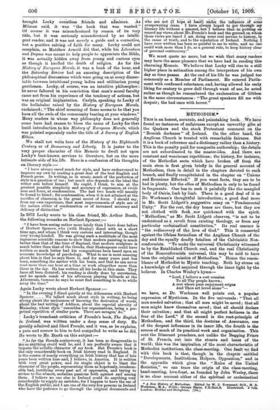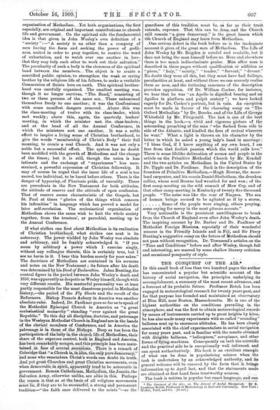METHODIS M.* Tmais an, honest, accurate, and painstaking book.. We have
found no instances of unfairness except, an unworthy gibe, at the Quakers and the, stock Protestant comment on the " Romish darkness " Ireland. On the, other hand, the Anglican Church is treated with remarkable fairness. But it is a book of reference and a. dictionary ritherthan a history. This is the penalty paid for composite authorship; the details are not subordinated to the master-idea. And ,there, are constant and wearisome. repetitions ; the history, for instance, of the Methodist sects which have , broken. off from the main stem is first given briefly in the general account of Methodism, then in detail in the chapters devoted to each branch, and finally recapitulated in the chapter on "Unions and Reunions Effected." If yon- want facts, they are to be had in plenty, but the ethos of Methodism is only to be found in fragments. One has to seek it painfully like the mangled body of Osiris, limb by limb. There is a good deal of it in Dr. Workman's thoughtful introduction; a good deal more in Mr. Scott Lidgett'S suggestive essay on " Fundamental Unity." For the rest; the dry bones are there, but they are not clothed with flesh, rnor quickened with the spirit. "Methodism;' as Mr..ScOtt Lidgett observes, "is not to be uuderitood as arevolt from existing theology, or from any partienlai ecclesiastical constitution." Its real essence is " the - rediscovery of the love of God." This it reasserted against the lifeless formalism o the Anglican Church of the day and the equally deadly fatalism of the Calvinistic Noe- conformiets. " To make the universal Christianity witnessed to by the Established Church real, and the real Christianity of the Ilenconformiefe universal, this may be said to have been the original mission of Methodism." Hence the resem- blance of Methodist to Mystic teaching. Both lay stress on a knowledge Of God acquired through the inner light by the believer. In Charles Wesley's hymn— "Lord, ; believe a rest remains To all Thy people known ;
A rest where pure enjoyment reigns
And Thou art loved alone"— we have, as Dr. Workman well points out, a popular expression -of Mysticism. In the five universals "That all men needed salvation; that all men might be saved;. that all men might know themselves saved that all should declare their salvation ; and, that all might perfect holiness the fear of the Lord," if the second is the-root-principle of Methodism, and the third, the doctrine of..Assurance, one of the deepest influences in its inneriffe, the fourth is .the source of much of its practical work and organisation. This sent the Itinerant preachers, not Unlike the Begging Friare of St. Francis, out into the streets and lanes of the world;, this was the 'inspiration :of • the most characteristio of Methodist institutions, the class`-meeting. - One fault we. find with this book is that, though in the chapter entitled "Developments, .institutions, Helpers, Opposition," and in the appendix which gives the . " &des of the United Societies,", we can trace the Origin of the cleat-meeting, band-meeting, love-feast, as founded by John Wesley, there is no clear account either of the spiritual or ecclesiastical • A Now History of Methodism. Edited by W. J. Towasead,.DtD., George H. Workman, M.A., D.Lit., Geo e Ears,, t.S. Illustrated. 2 v0 Hodder odder and Stoughton. [30s.] organisation.of Methodism., ;Yet both organisations, the first especially, are original and important contrilantiops.tuohurph life and government. On the ,spiritual aide the Aundamental idea is that given in John Wesley's own definition of a "society A society is no other than a company of men having the form and, :seeking the power of godli- ness, united in order to pray together, to receive the word of exhortation, and . to watch over one another , in, love, that they may help each other to. .work out ,their salvation." The peculiarity of such a body is the closeness of the spiritual bond between . the mernbera.;_ The object is to , create. a sanctified-public .opinion..-ta strengthen the weak , or, erring brother by the religious life of hia,fellowe, to.make, a veritable Communion of. Saints here on earth. This spiritual brother- hood was carefully organised. :The smallest meeting was, though it no longer survives, "The Band," -consisting. of two or three persons-of the, same sex., These unbosomed themselves freely: to one another; , it was the Confessional with some Manifest, dangers removed. Above this was the class-meeting of twelve _with its class-leader,. which met weekly; above this, again, the quarterly_ leaders' meeting, in which the minister met the class-leaders ; and ,at the . bead. of .all the Annual Conference, in which the mirdsters met one Another, I.was _ a noble effort to inspire a living sense of Christian brotherhood, to give the words "membership Of 0Eriat'S Body" their full meaning, to create a real Church.. And it was not only a noble but a successful effort. The: system has no doubt been modified with the growth of Methodism and the change of the. times; but it . is. still, though the union is less intimate and the exchange. of ," experiences" less unre- strained, a powerful expression of. Christian fellowship. It may of course be urged that the inner life of a soul is too sacred, too individual, to be bared before others. There is the danger of hypocrisy, of Pharisaic pride, of unreality. There are precedents in the New. Testament for both attitudes, the attitude of reserve and the .attitude of open confession. That of reserve seems characteristic of the Gospels, but St. Paul at times "glories of the, things which concern his infirmities" in language which has proved a model for later self-revelation. The ecclesiastical organisation of Methodism shows the same wish to knit the whole society together, from the trustees', or parochial, meeting up to the Annual Conference. „ If what strikes one first about Methodism is its realisation Of Christianbrotherhood, what strikes one next is its . • , autocracy.. The power wielded by John Wesley was absolute and .arbitrary, and he frankly acknowledged it. " If you mean . by arbitrary - power which I exercise singly, without any colleague therein, this is certainly true, but I see no harm in it. I bear this burden merely for your sakes." The doctrines of Methodism are contained in his sermons and notes on the New Testament ; its future after his death was determined by. his Deed of Declaration. Jabez Bunting, the central figure in the period between John Wesley's death and 1.850, was apparently as despotic as Wesley himself, though with very different results. His masterful personality was at least partly responsible for the most disastrous period in Methodist history,—the period of the P4 Sheets and the revolt of the Reformers. filial:lop Francis Ashriiy in America was another absolute ruler. Indeed, Dr. Faulkner goes so far as to speak of the Methodist Episcopal Church in America as "a great ecelesiastical monarchy" standing "over against the great Republic." To this day all discipline, doctrine, and patronage in the Wesleyan Methodist Chnichin.England are ix the hands of the clerical members of Conference, and in America the patronage is in those of the Bishop. Deep,as hasheen the participation of the laity in, the church life of Methodism, their share of the supreme control, both in England and America, has been. remarkably meagre, and this principle Ms been Main- tained. in face of several secessions. There is a remark of' Coleridge that "a Church is in idea, the only pure democracy,' and none who remembers .0hrist's words. can doubt its truth.. And Yet0.reat Churches and great Christian movements, even
rp-
when democratic in spirit, apparently tend to be autocratic in government- _ Roman Datholicism, Methodism, the.Jesnits, the Salvation- Army, otherwise Unlike, are alike in this. Perhaps the reason is that as at the .basis of all religious movements Must lie, if they are to be succeisful, a strong and permanent tradition—"the faith once delivered to the saints "—so the guardians. of this tra4ition. must be, tits .far as their tut extends, supreme. Tha1. this can be done, and the Church still. remain " a, pure democracy," is the great . lessen which tile. Church of England may learn from itethedism. One serious defect in the book before us is the inadequate account it gives, of ,the great men of .Metbpdisna. The Life of John Wesley by. Mr. 1.3iiden is careful and readable, but it does not bring. the man himself before us. Here and elseigh.ere .
there is too much indiscriminate praise., Man after man is described in these pages without q,ualification. or addition as pious," " holy," " saintly," " tender," "fervent, " ." de out No. doubt they were all this, but they musthave had failings, peculiarities at least, and without these we can scarcely realise them as men, and the irritating, sameness of the description provokes opposition. Of Dr. William Cocker, for instance, we bear that he, was "an Apollo in dignified bearing and an Apollos in platform. and pulpit oratory"; we have looked eagerly for 121.r. Cocker's portrait, but in vain. An eveption must be made in favour of the charming essay on " The Oxford MethadiSts " br, Brooks, and of the tifeoi.AeOriii Wbitefield by Mr. Fitzgerald. The last is (me of the best things in „the book,7--a vivid and ivlgorous picture of to astounding preaching of the man :` who flashed from aide to side of the Atlantic, and kindled the Area of revival wherever he went." What. a, light is thrown on his character by the letter in which he asked a young la,4y-'a . hand hi marriage: "I bless God,. if I know .anything of my ;own; heart, I am free from that foolish passion which the, world galls love." . _ There is some lifelike delineation of scenes and people in the article on the Primitive ,Methodist Church by Mr. Kendall and the two articles on Methodism in the United States kir Dr. Tipple and, Dr. Faulkner.Such is the description of . the founders of.Primitive Methodism,—.-Htigh ,Bourne, the, moor- land carpenter, and his cousin Daniel Shubotham, the drunken collier, whose soul Bourne had wrestled for and won; of the first camp-meeting on the wild summit of Mow Cop, and of that other camp-meeting in Kentucky of twenty-five thousand people. "The noise was like the roar of Niagara. The sea of human beings seemed to be agitated as if by a storm. Some of the people were singing, others praying, some crying for mercy in the most piteous accents."
Very noticeable is the persistent unwillingness to break from the Church of England even after John Wesley's death. The inspiring account by Dr. Barber and Dr. Faulkner of Methodist Foreign Missions, especially of their wonderful success in the Friendly Islands and in Fiji, and. Sir perpy Bunting's Suggestive essay on the future of Methodism should not pass without recognition, Dr.-Townsend's article& on the "Time and Conditions " before and after Wesley, though full and interesting, are marred by some shallow literary criticism and occasional pomposity of style.















































 Previous page
Previous page